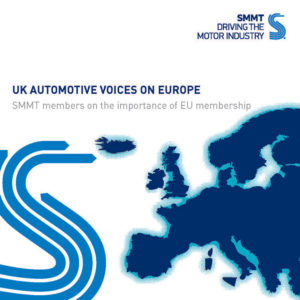- SMMT launches case studies of member views on the importance of Britain’s EU membership to UK automotive.
- Six British firms explain why single market access, influencing EU legislation, access to funding and talent are so critical to growth.
- 92% of SMMT members say UK membership of a reformed European Union is best for their business.
28 January 2016 British automotive firms have spoken out about why remaining in Europe matters to their businesses in a series of case studies published by The Society of Motor Manufacturers and Traders (SMMT) today. Voices on Europe features six companies from across a broad spectrum of the automotive sector, all driving technological innovation. They range from research and product testing houses to mechanical engineering firms, specialist component manufacturers and bio-fuel companies, with operations across the UK.
The firms include Allied Vehicles (Glasgow), Gasrec (London), Magal Engineering (Reading), HORIBA MIRA (Nuneaton), Nifco (Stockton-on-Tees) and Penny Hydraulics (Chesterfield). Each study gives tangible examples of how Britain’s EU membership has helped British business to grow.
In a 2014 survey of SMMT members, 92% said remaining in a reformed European Union would be best for their company, while more than three quarters[1] stated that withdrawal could have a negative impact on the size and diversity of foreign investment the UK currently enjoys. Respondents cited access to funding, the ability to shape technical rules affecting vehicle development, access to the single market and access to talent via the free movement of labour within Europe as reasons to remain.
Innovation has been a strong feature in the resurgence of the British automotive industry, which currently invests some £2.4 billion in Research & Development every year. For Gasrec, which supplies liquefied gas fuel to the road transport sector, securing £4.9 million of European funding to help it develop a pilot network of filling stations on UK motorways has been critical to its recent growth.
Meanwhile, world-leading engineering, research and testing company HORIBA MIRA relies on the UK’s position as ‘the gateway to Europe’ in attracting global organisations to establish their R&D operations at its Midlands base.
For Allied Vehicles, which manufactures and supplies wheelchair-adapted vehicles, Britain’s seat at the negotiating table in Brussels allowed it to work with government to shape crucial changes to legislation, which could have undermined its ability to export competitively.
EU membership offers the best terms with the world’s largest single market, reducing barriers to trade and the cost of exports. For Nifco, a specialist automotive plastics component supplier to global manufacturers based in the UK, and Penny Hydraulics, which makes cranes, lifts and commercial vehicle loading devices, the ability to trade without tariffs and supply both Britain and the continent is essential to business growth.
Magal Engineering, meanwhile, a global Tier-1 supplier to the world’s major vehicle manufacturers, also relies on tariff-free inter-company trading across Europe, importing parts to be finished in its UK factories. In addition, Europe’s free labour market allows the company to bring in specialists from its other European operations when UK skills shortages present a challenge.
Mike Hawes, SMMT Chief Executive, said, “Britain’s membership of the EU is critical to the future success of the UK automotive sector in terms of jobs, growth and future investment. Our members have been clear that they consider EU membership to be best for business – and the six companies featured in these case studies provide real examples of not only how it has benefited them, but also its huge value for whole automotive industry and the British economy.”









